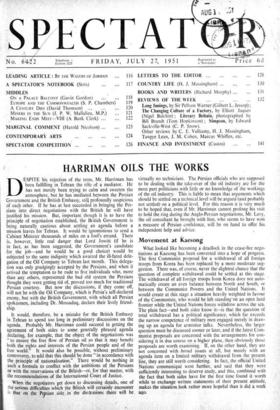HARRIMAN OILS THE WORKS
DESPITE his rejection of the term, Mr. Harriman has been fulfilling in Tehran the role of a mediator. He has not merely been trying to calm and sweeten the atmosphere, but he has mediated between the Persian Government and the British Embassy, still profoundly suspicious of eacti other. If he has at last succeeded in bringing the Per- sians into direct negotiations with the British he will have justified his mission. But, important though it is to have the principle of negotiation established, tire British Government is being naturally cautious about settling an agenda before a mission leaves for Tehran. It would be ignominious to send a Cabinet Minister thousands of miles on a fool's errand. There is, however, little real danger that Lord Jowitt (if he is in fact, as has been suggested, the Government's candidate for the job—and he would be a good choice) would be subjected to the same indignity which awaited the ill-fated dele- gation of the Oil Company to Tehran last month. This delega- tion was only grudgingly accepted by the Persians, and when it arrived the temptation to be rude to five individuals who, more than any others, represented the bad old system the Persians thought they were getting rid of, proved too much for traditional Persian courtesy. But now the discussions, if they come off, will not be with the Oil Company, which is Persia's self-declared enemy, but with the British Government, with which all Persian spokesmen, including Dr. Mossadaq, declare their lively friend- ship. "
It would, therefore, be a mistake for the British Embassy in Tehran to spend too long in preliminary discussions on the agenda. Probably Mr. Harriman could succeed in getting the agreement of both sides, to some generally phrased agenda declaring, for example, that the object of the negotiations was "to ensure the free flow of -Persian oil so that it may benefit both the rights and interests of the Persian people and of the free world." It would also be possible, without preliminary controversy, to add that this should be done "in accordance with the principle of nationalisation." There would be nothing in such a formula to conflict with the ambitions of the Persians or with the reservations of the British—or, for that matter, with the recommendations of the International Court of Justice.
When the negotiators get down to discussing details, one of the serious difficulties which the Bfitish will certainly encounter is that on the Prian side in the dis al ssions there will be virtually no technicians. The Persian officials who are supposed to be dealing with the take-over of the oil industry are for the most part politicians with little or no knowledge of the workings of the oil industry. This is liable to mean that arguments which should be settled on a technical level will be argued (and probably not settled) on a political level. For this reason it is very much to be hoped that, even if Mr. Harriman cannot prolong his visit to hold the ring during the Anglo-Persian negotiations, Mr. Levy, the oil consultant he brought with him, who seems to have won a measure of Persian confidence, will be on hand to offer his independent help and advice.


































